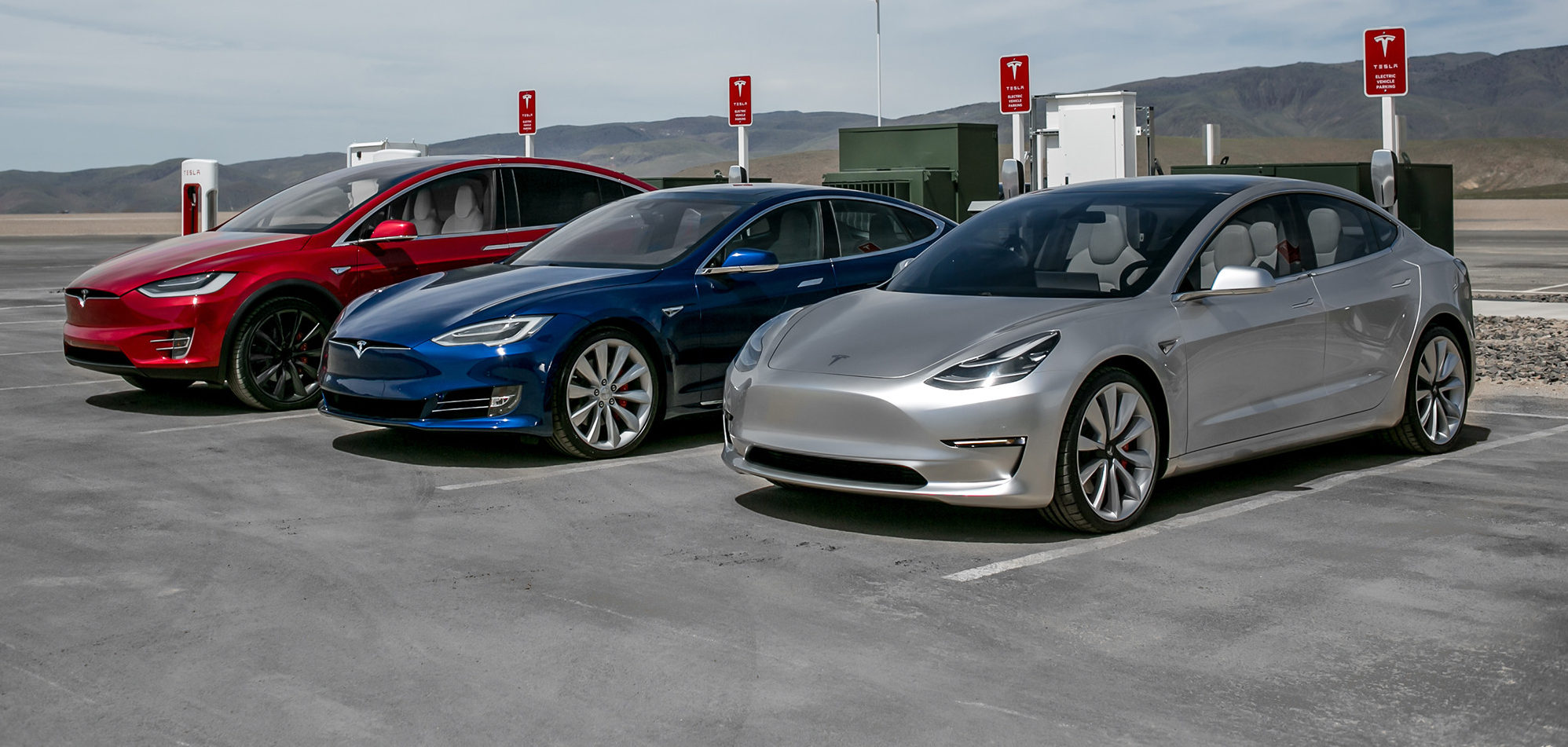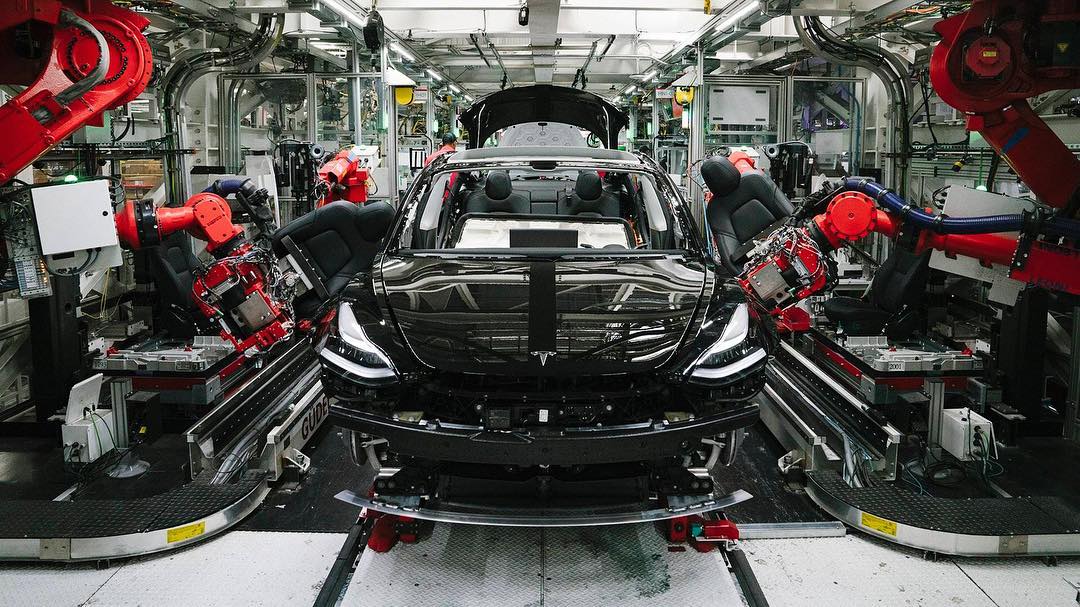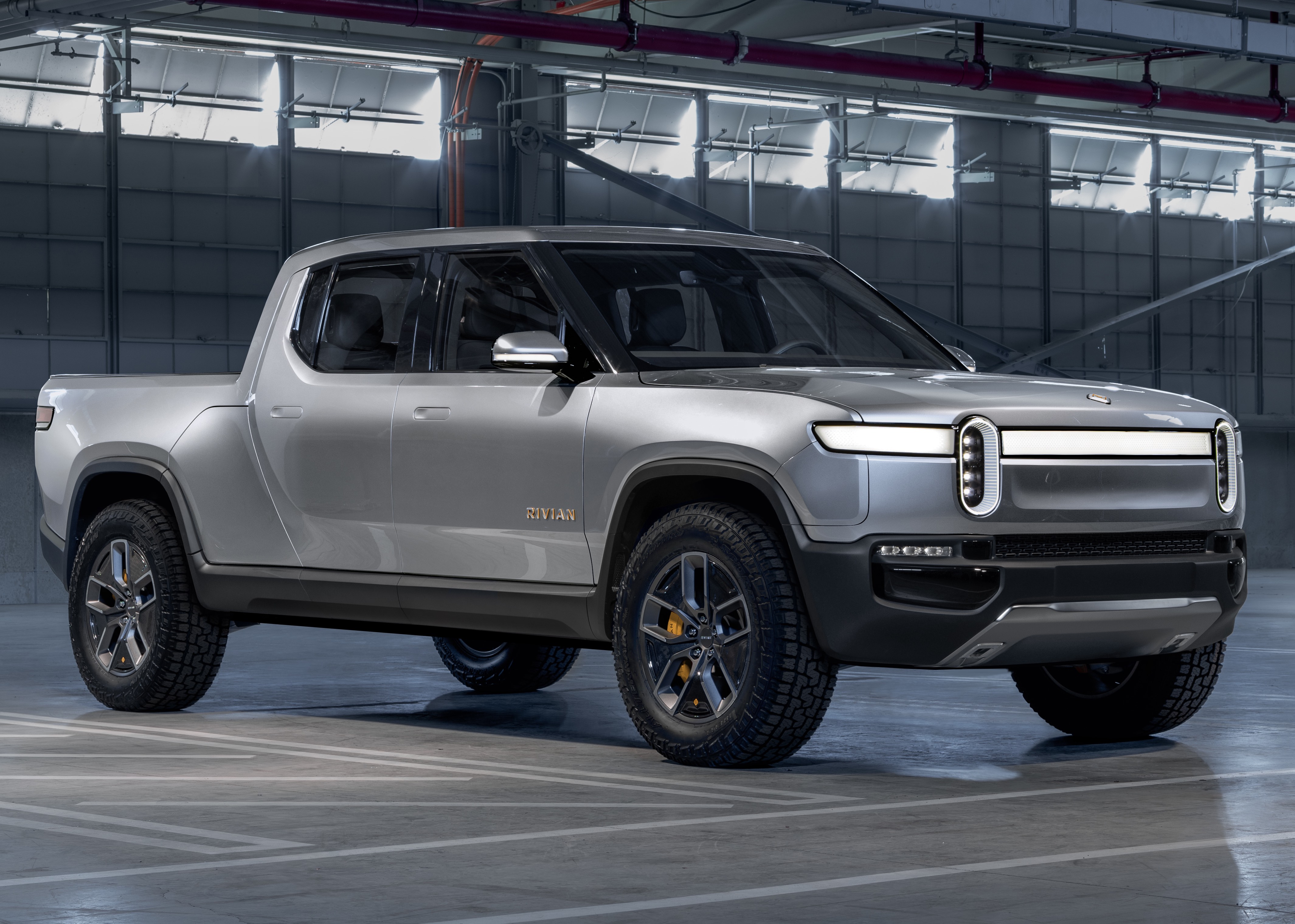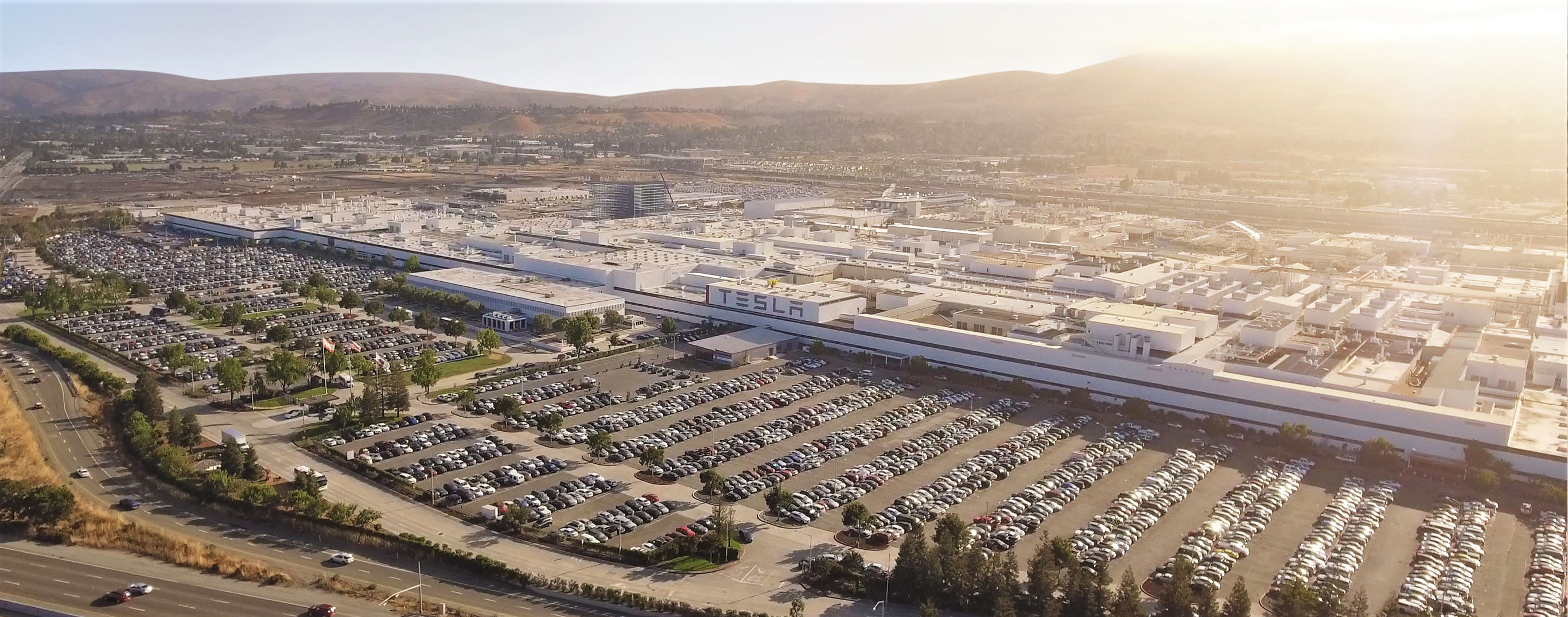

News
Tesla faces biggest challenge yet as oil industry fights to maintain its hold on US auto
Tesla might have overcome several notable hurdles this year, but the electric car maker is now facing what could very well be its biggest challenge yet in the United States. As the company hits its stride with the production of the Model 3 and as it prepares to ramp its energy business next year, a rather discreet movement is underway to ensure that America remains waist-deep in oil.
A recent expose published by The New York Times outlines an active campaign to roll back the country’s existing vehicle emissions rules. Earlier this year, the US government laid out a plan that aims to ease fuel efficiency standards in the country. The movement’s central point is simple — since America is so awash in oil, the country no longer needs to worry about energy conservation.
The publication’s investigation noted that the movement, which was supported by proposals in Congress and social media campaigns, is backed by some of the United States’ largest oil interests. Marathon Petroleum, the US’ largest refiner, as well as a policy network with ties to billionaire Charles G. Koch, contributed to help push the movement’s agenda. Overall, the creation of the proposal and its support from the oil industry is understandable, considering that the advent of electric vehicles threatens the bottom line of the industry. Less gas-thirsty cars on the road mean lower sales of gasoline. More pure electric vehicles on the road, such as Tesla’s electric cars, are an even bigger threat.
The US government’s initiative takes aim at the country’s emissions standards, which practically requires automakers to double the fuel efficiency of their vehicles by 2025. Under the government’s proposal, emissions standards would be frozen at 2020 levels. The NYT estimates that if the government’s planned rollback is implemented, it would increase greenhouse gas emissions in the United States by more than the amount of gases put out by midsize countries such as Austria, Greece, or Bangladesh in one year.

Lawmakers and delegations across the United States have backed the pro-oil campaign, with several groups sending letters to the Transportation Department to express their support. The publication noted that these letters featured much of the same phrasing, particularly a line directly referencing the preferences of American car buyers. “With oil scarcity no longer a concern, historically low gas prices, increasingly ambitious CAFE requirements, it is important that NHTSA and EPA review the mandate to ensure that the US is protecting consumers from higher costs and still allowing for choice in vehicles that best fit their needs,” one of the letters stated.
The oil-backed movement, though, is currently encountering some pushback from members of the government. Among these is Senator Tom Carper of Delaware, who expressed his criticism of the administration’s campaign. In a statement to the NYT, Carper noted that “oil interests are cynically trying to gin up support in Congress for the weakest possible standards to ensure that cars and SUVs have to rely on even more oil.” The senator added that “If this attempt is successful, the outcome will be a blow to the auto industry, consumers, and our environment.”
At the forefront of the resistance against the oil-backed campaign is California, home to Tesla’s headquarters and electric car factory. California pledged to stick to stricter emissions standards while maintaining an initiative to push the adoption of zero-emissions vehicles. Thirteen states currently follow CA’s lead, representing about 35% of the United States’ nationwide car sales.
At the heart of the movement is the notion that American car buyers prefer large, gas-guzzling vehicles such as full-sized pickup trucks and SUVs over zero-emissions vehicles. This is a market barely touched by electric car makers today, with cars such as the Tesla Model X competing in the luxury SUV segment — a far smaller and notably higher-priced market than those populated by gas-powered best-sellers such as the Chevrolet Suburban. The same is true for the pickup truck market, which is home to the Ford F-150, the country’s best-selling vehicle. Serious all-electric pickup trucks such as Rivian’s R1T have been unveiled recently, but just like the Model X, the R1T is a luxury vehicle at its core.

Tesla has matured greatly this year, as the company overcame the Model 3’s production hell and as Elon Musk dealt with the repercussions of his online behavior. Considering the pro-oil movement stirring in the country, though, Tesla might need to take even greater responsibilities in the immediate future. Being a first mover in the electric car revolution, Tesla has the potential to take the lead in bringing compelling vehicles that can compete with gasoline-powered cars on both performance and price. The company is already accomplishing this with the Model 3, as proven by the electric sedan’s impressive sales figures over the past months. So far, though, Tesla is yet to release vehicles that can truly take on the country’s gas guzzlers at a similar price point.
This might change next year, as Tesla is expected to reveal the Model Y SUV. The Model Y is designed to be the SUV counterpart of the Model 3 — powerful, practical, and attainable by the everyman — and if Elon Musk’s recent statements are any indication, the vehicle’s unveiling could be just around the corner. Tesla could very well be targeting the mainstream, seven-seat SUV market with the Model Y, with Musk recently describing the vehicle as a “midsize SUV” during an appearance at the Recode Decode podcast. Musk has also indicated that Tesla might be releasing its pickup truck earlier than expected.
Tesla, though, is not capable of pushing the EV revolution alone. Thus, it is pertinent for EV startups such as Rivian and Bollinger Motors to step up to the challenge and perhaps accelerate the development and release of their electric vehicles. Legacy automakers that have committed to an electrified future, such as Porsche and Jaguar, must expedite the release of compelling zero-emissions cars as well. Porsche and Jaguar have already taken a notable step with the Taycan and the I-PACE, but far more steps need to be taken.

For its part, Tesla would best be served by a steadier hand in the coming quarters. With an aggressive campaign to keep the United States entrenched in oil ongoing, Tesla must lead in a manner that is quick, efficient, and steady. Thus, mistakes such as the over-automation of the Model 3 assembly line, as well as Elon Musk’s Twitter gaffes, should best be avoided. Tesla is already a fast-evolving company, having grown to a major automaker in all but 15 years. Considering the presence of the government’s oil-backed campaign, though, Tesla is at a point where it must evolve even faster than before.
For now, the US’ auto industry appears to be facing a crossroads. On the one hand, there are companies such as Tesla proving that electric cars such as the Model 3 are viable and competitive. On the other hand, there are groups lobbying to maintain the auto industry’s reliance on oil. If a recent public hearing in Colorado is any indication, though, it appears that support for sustainable transportation is very much present.
Last month, Americans for Prosperity representative Shari Shiffer-Krieger attended a public hearing about Colorado’s pending decision to follow California’s lead. Americans for Prosperity is among the oil industry’s supporters. In Iowa, the group joined the fight against an initiative that would make it easier for gas stations to install electric car charging stations, and in Illinois, the group discouraged state officials from considering subsidies for EVs. Speaking to Colorado’s regulators, Shiffer-Krieger argued that buyers in the rugged state preferred powerful SUVs over stricter emissions rules.
“Coloradans deserve much better,” she said.
Colorado’s regulators accommodated her, before allying themselves with California.
News
Tesla cleared in Canada EV rebate investigation
Tesla has been cleared in an investigation into the company’s staggering number of EV rebate claims in Canada in January.

Canadian officials have cleared Tesla following an investigation into a large number of claims submitted to the country’s electric vehicle (EV) rebates earlier this year.
Transport Canada has ruled that there was no evidence of fraud after Tesla submitted 8,653 EV rebate claims for the country’s Incentives for Zero-Emission Vehicles (iZEV) program, as detailed in a report on Friday from The Globe and Mail. Despite the huge number of claims, Canadian authorities have found that the figure represented vehicles that had been delivered prior to the submission deadline for the program.
According to Transport Minister Chrystia Freeland, the claims “were determined to legitimately represent cars sold before January 12,” which was the final day for OEMs to submit these claims before the government suspended the program.
Upon initial reporting of the Tesla claims submitted in January, it was estimated that they were valued at around $43 million. In March, Freeland and Transport Canada opened the investigation into Tesla, noting that they would be freezing the rebate payments until the claims were found to be valid.
READ MORE ON ELECTRIC VEHICLES: EVs getting cleaner more quickly than expected in Europe: study
Huw Williams, Canadian Automobile Dealers Association Public Affairs Director, accepted the results of the investigation, while also questioning how Tesla knew to submit the claims that weekend, just before the program ran out.
“I think there’s a larger question as to how Tesla knew to run those through on that weekend,” Williams said. “It doesn’t appear to me that we have an investigation into any communication between Transport Canada and Tesla, between officials who may have shared information inappropriately.”
Tesla sales have been down in Canada for the first half of this year, amidst turmoil between the country and the Trump administration’s tariffs. Although Elon Musk has since stepped back from his role with the administration, a number of companies and officials in Canada were calling for a boycott of Tesla’s vehicles earlier this year, due in part to his association with Trump.
News
Tesla Semis to get 18 new Megachargers at this PepsiCo plant
PepsiCo is set to add more Tesla Semi Megachargers, this time at a facility in North Carolina.

Tesla partner PepsiCo is set to build new Semi charging stations at one of its manufacturing sites, as revealed in new permitting plans shared this week.
On Friday, Tesla charging station scout MarcoRP shared plans on X for 18 Semi Megacharging stalls at PepsiCo’s facility in Charlotte, North Carolina, coming as the latest update plans for the company’s increasingly electrified fleet. The stalls are set to be built side by side, along with three Tesla Megapack grid-scale battery systems.
The plans also note the faster charging speeds for the chargers, which can charge the Class 8 Semi at speeds of up to 1MW. Tesla says that the speed can charge the Semi back to roughly 70 percent in around 30 minutes.
You can see the site plans for the PepsiCo North Carolina Megacharger below.

Credit: PepsiCo (via MarcoRPi1 on X)

Credit: PepsiCo (via MarcoRPi1 on X)
READ MORE ON THE TESLA SEMI: Tesla to build Semi Megacharger station in Southern California
PepsiCo’s Tesla Semi fleet, other Megachargers, and initial tests and deliveries
PepsiCo was the first external customer to take delivery of Tesla’s Semis back in 2023, starting with just an initial order of 15. Since then, the company has continued to expand the fleet, recently taking delivery of an additional 50 units in California. The PepsiCo fleet was up to around 86 units as of last year, according to statements from Semi Senior Manager Dan Priestley.
Additionally, the company has similar Megachargers at its facilities in Modesto, Sacramento, and Fresno, California, and Tesla also submitted plans for approval to build 12 new Megacharging stalls in Los Angeles County.
Over the past couple of years, Tesla has also been delivering the electric Class 8 units to a number of other companies for pilot programs, and Priestley shared some results from PepsiCo’s initial Semi tests last year. Notably, the executive spoke with a handful of PepsiCo workers who said they really liked the Semi and wouldn’t plan on going back to diesel trucks.
The company is also nearing completion of a higher-volume Semi plant at its Gigafactory in Nevada, which is expected to eventually have an annual production capacity of 50,000 Semi units.
Tesla executive teases plan to further electrify supply chain
News
Tesla sales soar in Norway with new Model Y leading the charge
Tesla recorded a 54% year-over-year jump in new vehicle registrations in June.

Tesla is seeing strong momentum in Norway, with sales of the new Model Y helping the company maintain dominance in one of the world’s most electric vehicle-friendly markets.
Model Y upgrades and consumer preferences
According to the Norwegian Road Federation (OFV), Tesla recorded a 54% year-over-year jump in new vehicle registrations in June. The Model Y led the charge, posting a 115% increase compared to the same period last year. Tesla Norway’s growth was even more notable in May, with sales surging a whopping 213%, as noted in a CNBC report.
Christina Bu, secretary general of the Norwegian EV Association (NEVA), stated that Tesla’s strong market performance was partly due to the updated Model Y, which is really just a good car, period.
“I think it just has to do with the fact that they deliver a car which has quite a lot of value for money and is what Norwegians need. What Norwegians need, a large luggage space, all wheel drive, and a tow hitch, high ground clearance as well. In addition, quite good digital solutions which people have gotten used to, and also a charging network,” she said.
Tesla in Europe
Tesla’s success in Norway is supported by long-standing government incentives for EV adoption, including exemptions from VAT, road toll discounts, and access to bus lanes. Public and home charging infrastructure is also widely available, making the EV ownership experience in the country very convenient.
Tesla’s performance in Europe is still a mixed bag, with markets like Germany and France still seeing declines in recent months. In areas such as Norway, Spain, and Portugal, however, Tesla’s new car registrations are rising. Spain’s sales rose 61% and Portugal’s sales rose 7% last month. This suggests that regional demand may be stabilizing or rebounding in pockets of Europe.
-

 Elon Musk2 weeks ago
Elon Musk2 weeks agoTesla investors will be shocked by Jim Cramer’s latest assessment
-

 Elon Musk2 days ago
Elon Musk2 days agoxAI launches Grok 4 with new $300/month SuperGrok Heavy subscription
-

 Elon Musk4 days ago
Elon Musk4 days agoElon Musk confirms Grok 4 launch on July 9 with livestream event
-

 News1 week ago
News1 week agoTesla Model 3 ranks as the safest new car in Europe for 2025, per Euro NCAP tests
-

 Elon Musk2 weeks ago
Elon Musk2 weeks agoA Tesla just delivered itself to a customer autonomously, Elon Musk confirms
-

 Elon Musk1 week ago
Elon Musk1 week agoxAI’s Memphis data center receives air permit despite community criticism
-

 News2 weeks ago
News2 weeks agoXiaomi CEO congratulates Tesla on first FSD delivery: “We have to continue learning!”
-

 Elon Musk2 weeks ago
Elon Musk2 weeks agoTesla scrambles after Musk sidekick exit, CEO takes over sales














